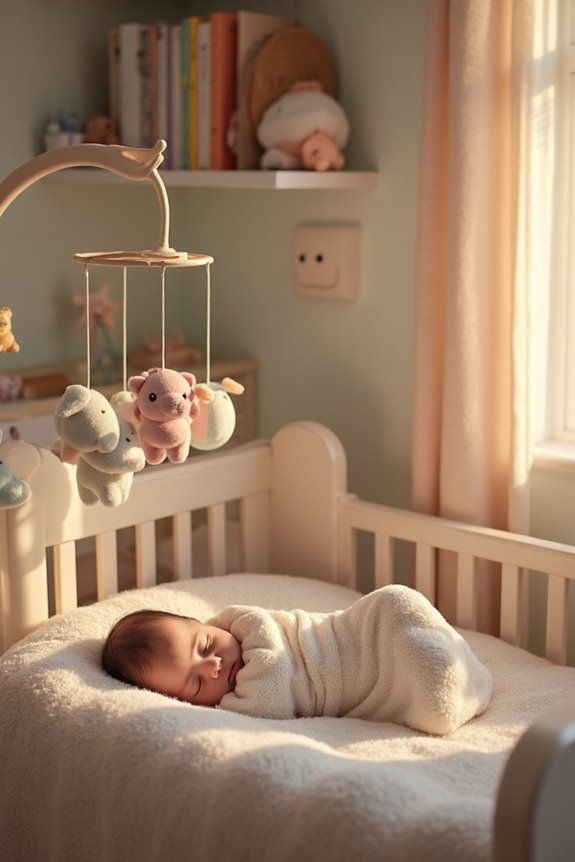We understand why babies sleep so much, and it’s all about development. Their growing bodies need ample rest, with newborns clocking 16 to 17 hours daily. This sleep isn’t just about rest; it’s crucial for releasing growth hormones that fuel height and brain development. They alternate between REM and NREM sleep to support brain maturation and tissue repair. As sleep patterns stabilize around six months, healthy sleep habits support their growth journey. We’ll explain more about sleep dynamics.
Key Takeaways
- Babies require 12 to 16 hours of sleep daily to support rapid physical growth and development.
- Sleep is crucial for releasing growth hormones, which promote height, muscle mass, and bone density in babies.
- Newborns sleep in short segments due to small stomachs and need regular feeding.
- REM sleep, which constitutes about 50% of a newborn’s sleep, is essential for brain growth and memory formation.
- As babies mature, their sleep patterns stabilize, with longer periods of NREM sleep for physical recovery.
The Role of Sleep in Baby Growth
When we think about the role of sleep in a baby’s growth, it’s fascinating to realize just how critical those peaceful hours are. Sleep isn’t just rest; it’s a powerhouse of growth.
- Growth Hormones Release: While we sleep, human growth hormones surge, allowing our little ones to gain height, muscle mass, and bone density.
- Tissue Repair: Quiet sleep phases are crucial for tissue repair, nurturing your baby’s physical development.
- Rapid Growth: Babies grow about an inch monthly from birth to six months. Sleep fuels this amazing transformation.
- Energy Restoration: Think of sleep as the battery recharge, ensuring your baby has the energy for continuous growth.
We can’t overstate how vital those 12 to 16 hours of sleep are each day. Sleep truly nurtures growth.
Understanding Newborn Sleep Patterns

To understand newborn sleep patterns, it’s crucial to recognize how different they are from ours. Newborns sleep about 16 to 17 hours daily, divided into short, frequent segments due to their need for regular feedings. Their sleep variability is notable, as each baby’s total sleep time can differ.
- Total Sleep Duration:
- Babies sleep extensively to support rapid growth.
- Sleep stabilizes as they age, especially after six months.
- Sleep Segments:
- Typically last 1 to 2 hours.
- Frequent awakenings are common due to small stomachs.
- Nighttime Sleep:
- Most don’t sleep through the night until at least 3 months.
- Nighttime stability increases with age.
This variability in newborn sleep reflects their developmental needs and gradual adjustment to a more structured sleep pattern.
The Importance of REM and NREM Sleep

As we learn about newborn sleep patterns, it’s important to explore the roles of REM and NREM sleep in early development. REM sleep is vital for brain growth, making up about 50% of a baby’s sleep. This active sleep stage, with its rapid eye movements and irregular breathing, supports memory formation and neurological maturation—key REM benefits. Babies can easily wake during REM, unlike the deeper, more restorative NREM sleep.
Let’s highlight the NREM significance: while initially a single stage, it’s crucial for physical growth and recovery. Known as “quiet sleep,” NREM allows babies to rest deeply, with minimal movement and regular breathing. As infants mature, they’ll spend more time in differentiated NREM stages, resembling adult sleep patterns.
Beginning Sleep Training

Beginning sleep training can seem daunting, but understanding the various methods can make it more manageable. We have several options to consider, each with unique comfort methods:
- Extinction Methods: Effective for many, these involve reducing parental intervention over time. Unmodified extinction slightly outperforms modified versions but only marginally.
- Graduated Extinction: Gradually increase response times to your baby’s cries, easing them into self-soothing.
- Parental Presence: Stay with your baby until they fall asleep, though it might not extend sleep duration.
- Cry It Out & Controlled Crying: Controversial yet structured, these involve allowing crying with scheduled comfort intervals.
Consistency is key, regardless of the method. Research shows sleep training can benefit up to 25% of babies, enhancing sleep without negative effects.
The Connection Between Sleep and Nutrition

Sleep training is just one piece of the puzzle; understanding how nutrition affects your baby’s sleep is equally important. Let’s explore how certain nutrients play a role in this delicate balance:
- Nutrient Timing: Feeding with the right nutrients before bedtime can enhance sleep quality.
- Tryptophan Impact: This amino acid influences sleep by calming brain activity.
- Breastfeeding Benefits: Breast milk, rich in nutrients that naturally fluctuate, helps in sleep regulation.
- Omega 3s Role: These support the central nervous system and improve sleep.
- Dietary Variety: A diverse diet ensures better nutrient absorption and sleep patterns.
Factors Impacting Baby Sleep Quality

Understanding the factors that impact a baby’s sleep quality is crucial, as it helps us create the best environment for restful nights. Let’s explore how environmental influences and emotional support play significant roles.
- Environmental Influences:
- Sleep Environment: Maintain a quiet, comfortable room with suitable temperature.
- Light Exposure: Encourage natural light during the day to aid circadian rhythms.
- Noise Levels: Keep noise minimal to avoid sleep disruptions.
- Emotional Support:
- Parental Involvement: Offer consistent, reassuring presence to foster security.
- Emotional Well-being: Ensure a stable emotional environment to promote better sleep.
Frequently Asked Questions
How Does Room Temperature Affect a Baby’s Sleep Duration?
We understand the importance of maintaining perfect ambient temperature for our little ones. It directly impacts their sleep quality. Too hot or too cold? It disrupts their rest, reducing sleep duration and affecting overall well-being.
Can Teething Disrupt a Baby’s Sleep Patterns?
Imagine teething symptoms like a storm disrupting calm seas; they can cause sleep disruptions for our little ones. It’s essential we navigate these choppy waters together, using soothing techniques and maintaining consistency to restore peaceful nights.
What Role Does White Noise Play in Helping Babies Sleep?
Let’s explore white noise’s role in soothing our little ones. White noise benefits babies by masking disruptions, improving sleep quality, and providing a calming effect. Sound machines ensure a consistent sleep environment, making bedtime easier for everyone.
How Do Vaccinations Impact a Baby’s Sleep Schedule?
In the grand tapestry of parenting, we’ve observed how vaccinations can lead to sleep disturbances in babies. These vaccination effects may cause altered sleep schedules, often increasing sleep duration, especially with afternoon doses. Rest easy together.
Do Baby Sleep Patterns Vary by Individual Temperament?
Yes, baby sleep patterns do vary by individual temperament. We see how temperament factors influence sleep variations, making each baby’s needs unique. Let’s embrace these differences and understand our little one’s unique rhythm together.





